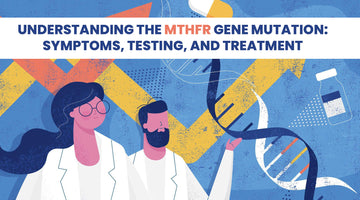A recent research study says that our genes hold the keys to many aspects of our health. One gene that has garnered significant attention in the field of genetics and health is the MTHFR gene. Short for Methylenetetrahydrofolate Reductase, this gene encodes an enzyme crucial for processing folate, a vital B vitamin (B9). Its role in a process called methylation, which affects various biochemical reactions within the body, is undeniable. The MTHFR gene mutation, a genetic variation that can influence its functioning, has become a subject of interest for researchers and healthcare providers.
In this blog post, we will look at the MTHFR gene mutation, exploring its various facets, including symptoms, testing methods, and available treatments, to empower individuals to make informed decisions about their health.
What is MTHFR Gene Mutation?

MTHFR is an acronym for the Methylenetetrahydrofolate Reductase gene, which encodes an enzyme responsible for processing folate, a crucial B vitamin (B9). This gene plays a pivotal role in a process called methylation, which is involved in various essential biochemical reactions within the body.
The MTHFR gene mutation is a genetic variation that affects the functioning of the MTHFR enzyme. There are several variants of the MTHFR gene mutation, with the two most common ones being C677T and A1298C. When an individual carries one or two copies of these mutated genes, their ability to convert folate into its active form is impaired. This deficiency can have various consequences for overall health.
Symptoms and Issues Associated with MTHFR Gene Mutation

The symptoms of an MTHFR gene mutation can be diverse and may vary from person to person. It's important to note that not everyone with an MTHFR gene mutation will experience these symptoms, and the severity can differ depending on the specific mutation and other genetic and environmental factors. Some common symptoms and health issues associated with MTHFR gene mutations include:
-
Cardiovascular Issues:
- Increased risk of blood clots and thrombosis.
- Elevated homocysteine levels, which can contribute to heart disease.
-
Mental Health Concerns:
- Increased risk of depression and anxiety.
- Impaired neurotransmitter production, potentially leading to mood disorders.
-
Pregnancy Complications:
- Increased risk of miscarriages.
- Birth defects in the developing fetus due to impaired folate utilization.
-
Neurological Symptoms:
- Migraines and chronic headaches.
- Cognitive impairments and neurodevelopmental disorders in children.
-
Gastrointestinal Symptoms:
- Digestive issues, including irritable bowel syndrome (IBS) and food sensitivities.
- Impaired detoxification processes.
-
Fatigue and Low Energy:
- Chronic fatigue and low energy levels.
- Difficulty in recovering from physical and mental stress.
It's important to remember that these symptoms can overlap with various other health conditions, making it challenging to diagnose an MTHFR gene mutation based solely on symptoms. Therefore, for those experiencing these issues or at risk due to family history, genetic testing is recommended.
How Do You Test for MTHFR Gene Mutation?

Testing for an MTHFR gene mutation involves a simple and non-invasive process. You can opt for either a blood test or a cheek swab to check for genetic mutations. These tests are readily available through healthcare providers, genetic testing companies, and online services. Here's how the testing process generally works:
-
Consultation:
-
Sample Collection:
-
Laboratory Analysis:
-
Results:
MTHFR Gene Mutation Treatment

The management and treatment of MTHFR gene mutations aim to address the underlying genetic deficiency and mitigate associated health risks. Here are some strategies commonly employed in the treatment of MTHFR gene mutations:
-
Dietary Modifications:
-
Folate Supplementation:
-
B Vitamin Complex:
-
Lifestyle Changes:
-
Healthy Diet:
-
Stress Management:
-
Medications:
-
Blood Thinners:
-
Antidepressants:
-
Pregnancy Considerations:
-
Preconception Care:
-
Prenatal Supplements:
-
Genetic Counseling:
- Genetic counselors can provide invaluable guidance to individuals and families with MTHFR gene mutations. They can help individuals understand their genetic risks and make informed decisions about family planning and healthcare choices.
It's important to note that the treatment plan for an MTHFR gene mutation should be individualized, considering the specific mutation, overall health, and other genetic and environmental factors. Always consult with a healthcare professional, particularly one with expertise in genetics and nutrition, to create a personalized approach to manage the condition.
Why Choose BioEnergy Assist's MTHFR Supplements?
BioEnergy Assist's MTHFR supplements harness the concept of BioEnergies, akin to the waves of sound and light that impact our bodies. These BioEnergies can be absorbed by essential enzymes like MTHFR, MTR, and MTRR, optimizing and energizing them. Scientific research recognizes that specific frequencies and amplitudes can prevent physiological dysfunctions and diseases. BioEnergies, with their precise frequencies, are embedded in these tablets to enhance biological oscillators. Dr. Thibaud d’Oultremont, a Ph.D. in Biology with over a decade of experience in energy healing, has developed these products. Now, these groundbreaking supplements are available, with a total of 200 CEA (Calibrated Energy Amplitude) in each tablet. Here's why our MTHFR supplements are your optimal choice:
- Support for MTHFR Gene Variants: Our MTHFR Optimizer Pills are specifically formulated to cater to individuals with MTHFR gene mutations. This targeted support is designed to enhance enzyme resonance and address enzymatic pathways affected by these mutations, ultimately optimizing nutrient metabolism and promoting your overall well-being.
- Optimal Nutrient Utilization: MTHFR gene mutations can hinder the conversion of essential nutrients, such as folate, into their active forms. Our MTHFR Optimizer Pills work by promoting resonance within the enzymes responsible for these conversions. This helps your body effectively utilize these essential nutrients, which can lead to improved health and vitality.
- Enhanced Methylation Support: Healthy methylation is crucial for various bodily functions, including detoxification, hormone regulation, and neurotransmitter balance. Our MTHFR Optimizer Pills aim to support these vital methylation pathways by promoting resonance with the enzymes involved, contributing to your overall well-being.
- Commitment to Quality and Safety: We prioritize your safety and well-being. Our tablets are manufactured in a GMP approved and FDA registered facility, ensuring that you receive a premium product that meets the highest industry standards. You can trust the quality and safety of our MTHFR supplements.
- Excellent Customer Service: Your satisfaction is our top priority. We are always ready to listen to your questions and suggestions. If you ever feel unsatisfied with your purchase, our team is committed to providing you with the best experience with our MTHFR Optimizer. We are here to support you on your health journey.
In summary, choosing BioEnergy Assist's MTHFR Supplements means selecting a product designed to meet the specific needs of individuals with MTHFR gene variants. Our commitment to quality, safety, and customer satisfaction, along with our innovative BioEnergy approach, sets our MTHFR Optimizer Pills apart as a trusted and effective solution for optimizing your overall well-being.
Conclusion
The MTHFR gene mutation is a genetic variation that affects the body's ability to process folate and participate in essential methylation processes. While not everyone with this mutation experiences symptoms, those who do can face a range of health challenges, including cardiovascular issues, mental health concerns, pregnancy complications, and more. Testing for an MTHFR gene mutation is straightforward and can provide valuable information for personalized treatment and management strategies. If you suspect you have an MTHFR gene mutation or have a family history of it, seeking professional guidance is crucial. A healthcare provider or genetic counselor can help you navigate the testing process, interpret the results, and develop a tailored treatment plan to support your overall health and well-being.
By understanding and addressing your MTHFR gene mutation, you can take proactive steps towards a healthier and more fulfilling life.
Read More Blog: What is the Function of Histamine?
Frequently Asked Questions
-
Can I have an MTHFR gene mutation if I don't experience any symptoms?
Yes, it's possible to have an MTHFR gene mutation without experiencing noticeable symptoms. Some individuals with this mutation remain asymptomatic throughout their lives. However, the presence of the mutation can still increase the risk of certain health conditions, so it's important to consider testing if you have a family history of MTHFR mutations or other risk factors.
-
Are MTHFR gene mutations more common in certain populations?
MTHFR gene mutations can vary in prevalence among different populations. The C677T and A1298C variants, for instance, are more commonly found in some ethnic groups, including individuals of European descent. However, these mutations can be found in people of all ethnic backgrounds. Genetic testing can determine if you carry these mutations.
-
Can an MTHFR gene mutation be passed on to my children?
Yes, MTHFR gene mutations can be inherited from one or both parents. If both parents carry the mutation, their children have a higher likelihood of inheriting two copies of the mutated gene, which may increase the risk of associated health issues. Genetic counseling can help families understand and manage these genetic risks.
-
Is it safe to self-administer supplements to address an MTHFR gene mutation?
It's important to exercise caution when self-administering supplements to address an MTHFR gene mutation. While some people may benefit from methylfolate and other B vitamin supplements, the dosages should be tailored to an individual's specific needs and genetic profile. Excessive supplementation can lead to adverse effects. Consult a healthcare provider or genetic counselor to determine the right approach for your situation.






